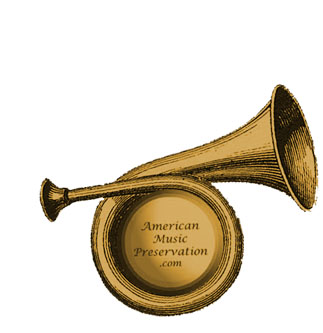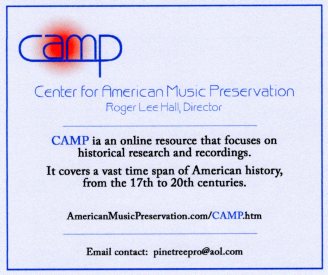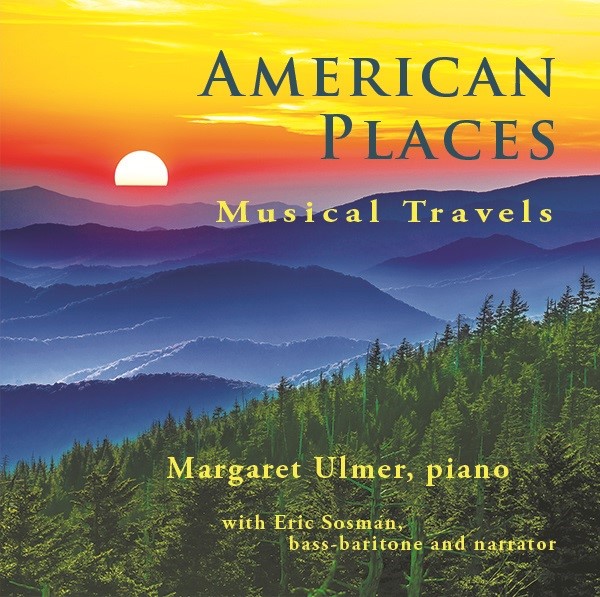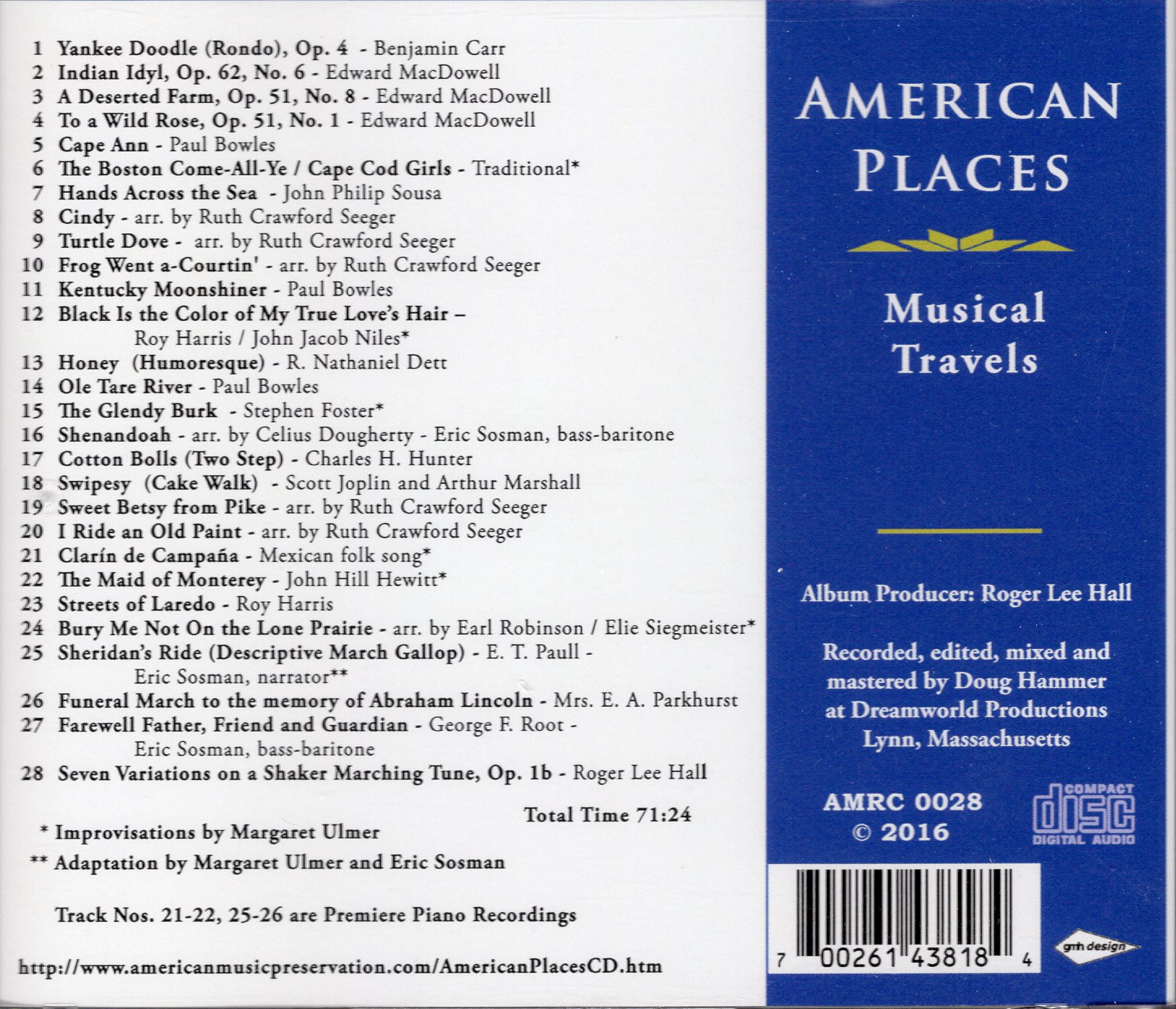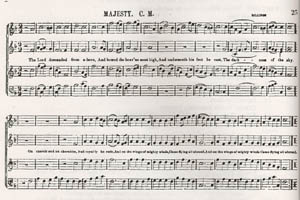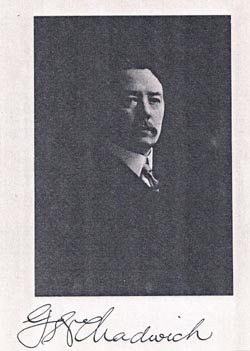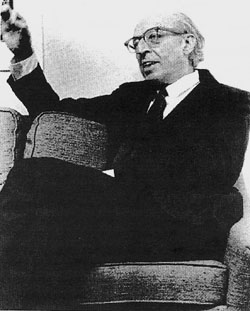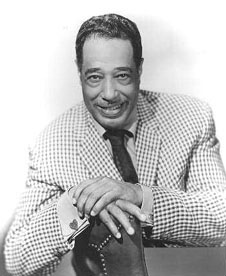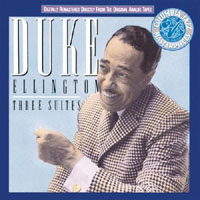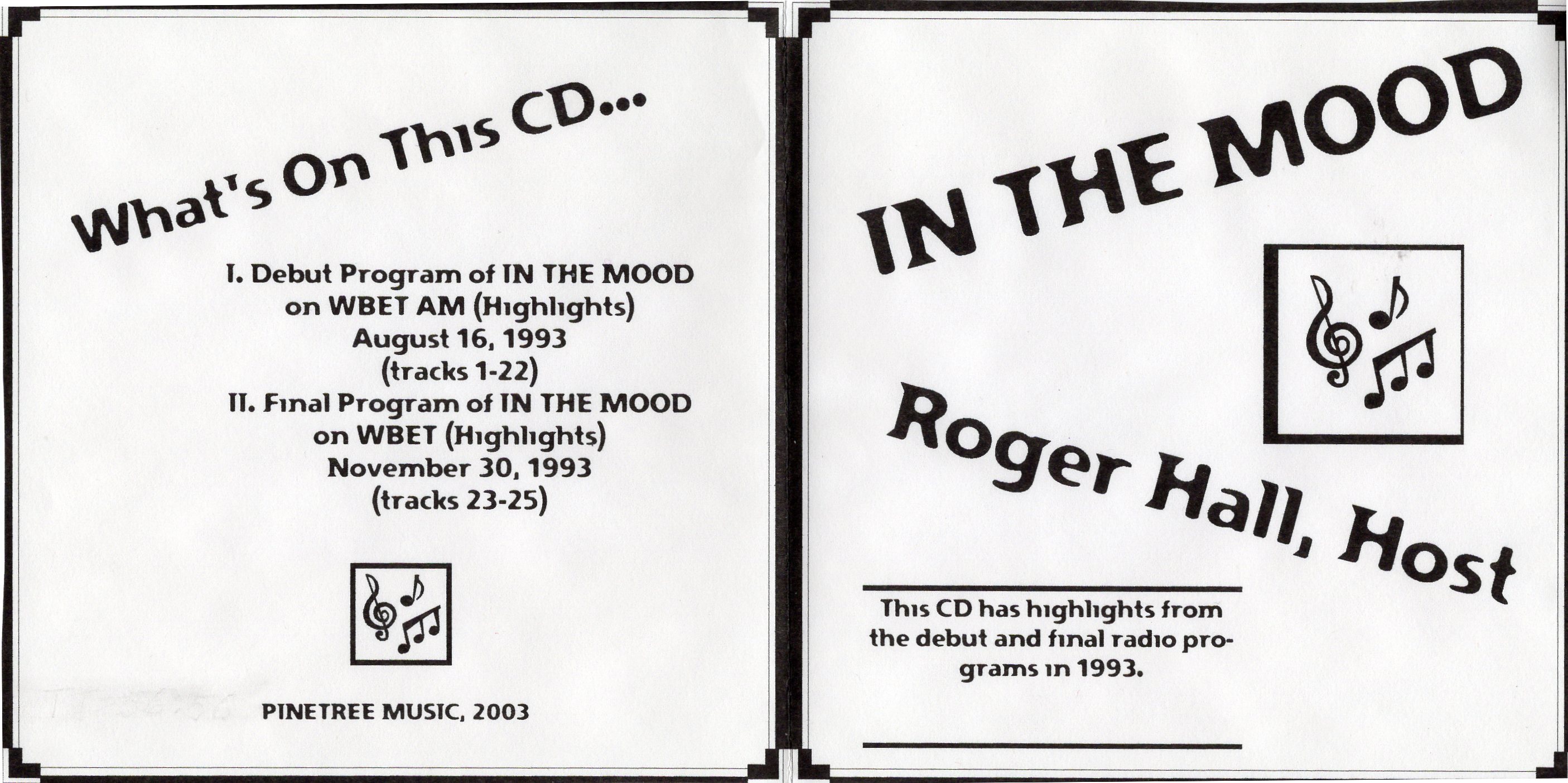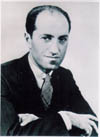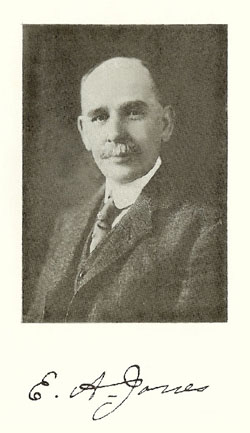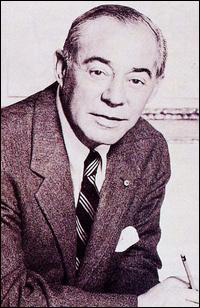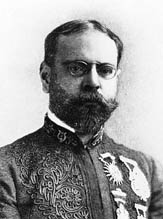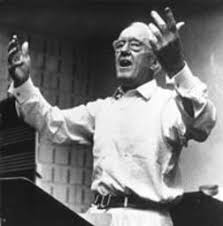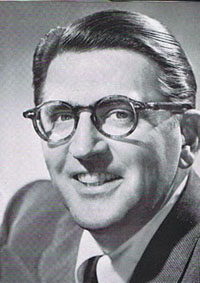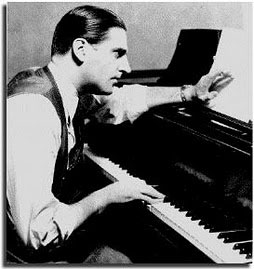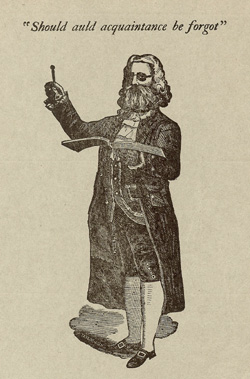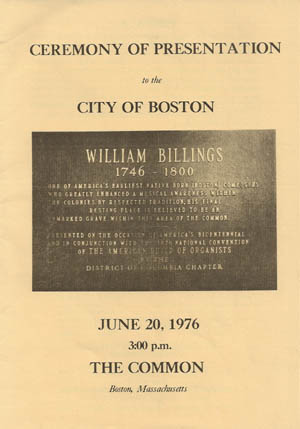
Twenty American Composer Anniversaries
Anniversary tributes to American composers from the past arranged in alphabetical order --
Leroy Anderson (1908 - 1975) -- 100th anniversary of his birth
Elmer Bernstein (1922-2004) -- 100th anniversary of his birth
William Billings (1746 -1800) -- 250th anniversary of his birth
George Whitefield Chadwick (1853-1931) -- 150th anniversary of his birth
Aaron Copland (1900 - 1990) -- 100th anniversary of his birth
Edward "Duke" Ellington (1899 - 1974 ) -- 100th anniversary of his birth
Stephen Collins Foster (1826 - 1864) -- 175th anniversary of his birth
George Gershwin (1898 - 1937) -- 100th anniversary of his birth
Bernard Herrmann (1911-1975) -- 100th anniversary of his birth
Francis Hopkinson (1737-1791) -- 275th anniversary of his birth
Charles Edward Ives (1874 - 1954) -- 50th anniversary of his death
Edwin Arthur Jones (1853-1911) -- 100th anniversary of his death
Edward MacDowell (1860 - 1908) -- 150th anniversary of his birth
Jerome Moross (1913-1983) -- 100th anniversary of his birth
David Raksin (1912-2004) -- 100th anniversary of his birth
Richard Rodgers (1902 - 1979) -- 100th anniversarary of his birth
John Phillip Sousa (1854 - 1932) -- 150th anniversary of his birth
George Templeton Strong (1856-1948) --150th anniversary of his birth
Randall Thompson (1899 - 1984) -- 100th anniversary of his birth
Meredith Willson (1902 - 1984) -- 100th anniversary of his birth
Please help support the Center for American Music Preservation by ordering this highly rated AMRC CD:

Leroy Anderson
Memorable miniaturist on the centennial anniversary of his birth
Born: Cambridge, Massachusetts, 19 June 1908
Died: Waterbury, Connecticut, 19 May 1975
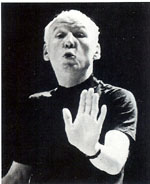
(Photo courtesy of MCA Classics)
Leroy Anderson was born one hundred years ago in Cambridge, Massachusetts.
After his graduation from Harvard University, he became acquainted with Arthur Fiedler of the Boston Pops and that led to a series of light classical pieces, including: "Jazz Pizzicato" (Anderson's first published piece in 1939), "The Last Rose of Summer" (1947), and "Bugler's Holiday" (1954). He also composed a series of delightful evocative "sound" pieces, such as:, "The Syncopated Clock" (1945), "The Typewriter" (1950), and "Sandpaper Ballet" (1954).
His biggest hit was "Blue Tango" (1951), for which he received a gold record for sales over a million copies.
Some of his pieces also had lyrics written for them, especially the still popular Christmas song, "Sleigh Ride," with lyrics by Mitchell Parrish (1950).
Edward Jablonski described the music best when he wrote:
Of course, the music of Leroy Anderson speaks -- or rather sings -- for itself. Because he is a superb musician as well as an initimable creator, Leroy Anderson can deftly use any number of musical devices...The miracle is that, for all the painstaking labor, each composition by Leroy Anderson invariably sounds as if it had sprung spontaneously to life at the moment we hear it -- fresh, ever new and enchanting.
-- CD notes in The Leroy Anderson Collection
Leroy Anderson made a series of successful recordings for Decca between 1950 and 1962. These recordings were first released on a Double LP album set and are now available on a highly recommended CD set:
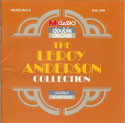
The Leroy Anderson Collection (MCA Classics, 2 CDs)
In 1968, Anderson made this honest statement about composing:
It is important to keep in mind the fact that music should be truely different and unique
so that a contribution to musical literature is being made when it is written.--Purdue Esponet, 13 February 1968
He was inducted into the Songwriters Hall of Fame in New York in 1988.
In addition to his songwriting talents, he should be remembered also as a classical composer who brought light-hearted music to millions of concert goers and listeners.
He developed a unique style of composing delightful short pieces often lasting three minutes or less.
He championed this type of music and treated it as seriously as composing a concerto or a symphony.
He also demonstrated his skill as a conductor and made many recordings, as well as those made by the Boston Pops, under Arthur Fiedler's direction.
On this centennial year of his birth, it is appropriate to pay tribute to Leroy Anderson, a highly accomplished composer known for his many
"Memorable Miniatures."
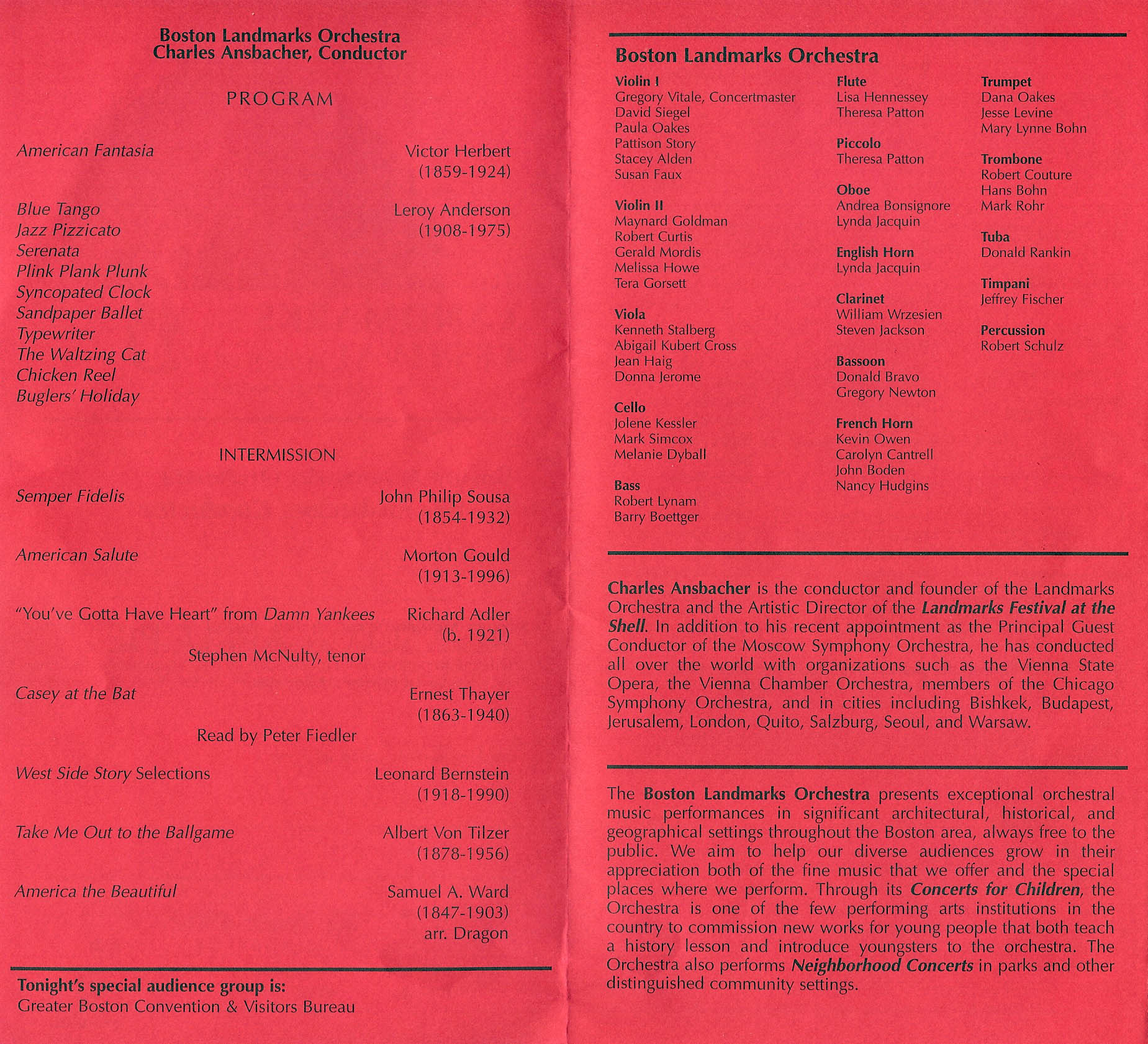
Concert program of Boston Landmarks Orchestra,
Charles Ansbacher, Conductor
from September 3, 2008 of
The Landmarks Festival at the Shell.
The concert title:
"RED SOX & APPLE PIE: A Tribute to Leroy Anderson"
To read about this organization, go to:
Links:
Leroy Anderson (Official Website)
Leroy Anderson (Wikipedia entry)
Leroy Anderson (Classical Composers Database)
Leroy Anderson: Master of the Miniature (NPR tribute)
William Billings
Father of American Choral Music
on the
250th anniversary of his birth
Born: Boston, Massachusetts, 7 October 1746
Died: Boston, Massachusetts. 28 September 1800
Important Correction!
There is an image circulating on the Internet which claims to be a portrait of William Billings. There is no known portrait of Billings. The portrait shown here and on other sites is actually a portrait of 19th century hymnwriter, Lowell Mason.
Married: Lucy Swan in Stoughton, Massachusetts on 26 July 1774. Lucy had been a pupil in the Billings singing school taught in Stoughton in 1774, which consisted of 49 pupils [not 48 --as written in most books]. Lucy was born in 1751 and died in Boston in 1795.
For more information about Billings, go to -- Father of American Choral Music
200th Anniversary Observance in 2000Boston, Massachusetts
On a rain soaked Tuesday, a day and evening "sing" was held at King's Chapel (built in 1749) at the corner of Tremont and School Streets in Boston, Massachusetts. The date was September 26 - the actual date when Billings died in 1800.
In observance of the 200th anniversary of his death, an exuberant chorus from points far and wide, including England, sang selected hymns and anthems of William Billings. The singing was organized by Billings 2000 ( Sheila Beardslee Bosworth, King's Chapel Tuesday Recitals; Gina Balestracci and Roland Hutchinson from Garden State Sacred Harp Singers). A large volume of music was skillfully prepared by Roland Hutchinson titled: "William Billings 2000 - The book of his bicentennial commemoration at Boston."
In typical Sacred Harp fashion, various singers offered to lead the individual Billings pieces.
Neely Bruce came with his group of Sacred Harp singers from Wesleyan University in Middletown, Connecticut.
Also Roger Hall, represented the Old Stoughton Musical Society and led two Billings tunes ( STOUGHTON and MAJESTY ), plus an original canon , "Come Let Us Sing," which Hall had composed on words from the last Billings tunebook of 1794. All three of these pieces led by Roger Hall are included in a monograph described below.
Billings and the Stoughton Singing School
The Stoughton Musical Society was organized twelve years after Billings taught his singing school in Stoughton in 1774. It is now the oldest choral society in the United States.
For more information, go to: Singing Stoughton
There is also an enjoyable one hour video titled, A Stoughton Musicfest. The first portion of the video features William Billings himself (played by a local professional actor) leading a singing school in Stoughton to young students and featuring two Billings tunes: CHESTER and STOUGHTON.
**************************
These collections include music by Billings:
AMRC 0001 -- The Best of William Billings
AMRC 0004 -- The New England Harmony
AMRC 0010 - "The Liberty Song" - Earlier American Song Treasury
AMRC 0011 -- "New Bethlehem" - Christmas Music in New England
AMRC 0013 -- "A Toast": Music of George Washington's Time
AMRC No. 14 -- "The Heavenly Vision" - Music From Stoughton
Learn more about the life and music of Billings.This monograph by Roger Hall was written in commemoration of the 200th anniversary of the death of Billings in 2000.
Commercial CDs of Billings music from Amazon.com:
The Birth of Liberty: Music of the American Revolution - Various artists (New World CD #80276, 1996 - Billings pieces: "Lamentation Over Boston"; " Independence."
A Land of Pure Delight - His Majesties Clerkes (Harmonia Mundi CD #907048, 1992) - 16 Billings compositions
The Liberty Tree: American Music, 1776-1861 - The Boston Camerata, Joel Cohen, director (Erato CD #21668, 1998) - Billings pieces: " Chester"; " David's Lamentation."
Make a Joyful Noise: Mainstreams and Backwaters of American Psalmody, 1770-1840 - Oregon State University Choir, Ron Jeffers, conductor (New World Records CD # 80255, 1996) - Billings pieces: "Chesterfiled"; "The Dying Christian's Last Farewell"; "Washington"; "Richmond."
Trav'ling Home: American Spirituals, 1770-1870 - The Boston Camerata, Joel Cohen, conductor (Erato CD #21668, 1996) - Billings pieces: "Invocation"; " Richmond"; " Warren."
William Billings: Wake Ev'ry Breath - William Appling Singers & Orchestra (New World Records #80539, 1998) - 13 Billings compositions. To read about the William Appling Singers recordings, go to: www.muzen.com/appling.html
George Whitefield Chadwick
Master of Second New England School
Born: Lowell, Massachusetts, New York, 13 November 1854
Died: Boston, Massachusetts, 4 April 1931
Read about this composer and his music at:

Aaron Copland
Dean of American Composers
on the centennial anniversary of his birth
Born: Brooklyn, New York, 14 November 1900
Died: North Tarrytown, New York, 2 December 1990
A Conversation with Aaron Copland
In commemoration of the Copland Centennial, a one hour CD is now available for the FIRST TIME.The conversation took place in July of 1980 at Copland's " Rock Hill" home in Cortlandt, New York.
During the hour long conversation, Copland talks about his orchestral music, his friendship with Leonard Bernstein, his film music, his film music, his arrangements of the Shaker song, "Simple Gifts," and his admiration for Charles Ives and his songs.For more information, about "A Conversation with Aaron Copland,"
see AMRC 0005 at theAmerican Music Recordings Collection
Can you guess where Aaron Copland placed in an Internet poll?
To see the results, go to:Top Ten Favorite American Composers
More information is available at

Edward Kennedy ("Duke") Ellington
America's Greatest Jazz Composer
on the centennial anniversary of his birth
Born: Washington, D.C., 29 April 1899
Died: New York, New York, 24 May 1974
Edward Kennedy Ellington was one of the founders of Big Band jazz and considered by many to be the greatest American jazz composer of the 20th century.
He was incredibly prolific and wrote works for stage, screen, sacred music, concert hall and many classic pop songs.
Among his memorable songs are: "Don't Get Around Much Anymore" (1942); "It Don't Mean a Thing If It Ain't Got That Swing" (1932); "Mood Indigo" (1931); "Solitude" (1935); "Sophisticated Lady" (1933); and "Satin Doll" (1958).
His theme song was "Take the A Train" (1941) by Billy Strayhorn.
Recommended Books:
Beyond Category: The Life and Genius of Duke Ellington. By John Edward Hasse. Foreword by Wynton Marsalis. (Paperback, 1995).
Music is My Mistress. By Duke Ellington (paperback, 1988).
Recommended CDs:
Even though Ellington is the greatest jazz composer, he also composed some fine concert works. Here are a few of them:
Duke Ellington: Three Suites (1960). "The Nutcracker Suite" ( Tchaikovsky); "Peer Gynt Suites Nos. 1 and 2" ( Grieg); "Suite Thursday" (Ellington-Strayhorn). Arrangements by Duke Ellington and Billy Strayhorn. Duke Ellington and His Orchestra. Columbia CD CK 46825 (Digitally remastered from the original analog tapes). If you watched the wonderful PBS TV concert with the New York Philharmonic, conducted by Kurt Masur and the Lincoln Center Jazz Orchestra, led by Wynton Marsalis, then you heard the Peer Gynt Suites. Here are the originals and they are all together on this wonderful release. A classic!
Harlem. Also includes: Symphony No. 2 (William Grant Still, 1895-1978); Negro Folk Symphony (William Levi Dawson, 1899-1990). Detroit Symphony Orchestra, Neeme Jarvi, conductor. Chandos CD 9226, 1994.
The River (Suite). Also includes: Symphony No. 1 ( William Grant Still). Detroit Symphony Orchestra, Neeme Jarvi, conductor. Chandos CD 9154, 1993.
Several of his early jazz compositions are featured on the premiere program of "In The Mood" with Roger Hall
The two Ellington recordings are: "Ring Dem Bells" (1930) and "It Don't Mean A Thing If It Ain't Got That Swing (1932)
See Remembering Radio
See where Duke Ellington placed in an Internet Poll at:
Top Ten Favorite American Composers
Stephen Collins Foster
America 's First Great Song Composer
on the 175th anniversary of his birth
Born: Lawrenceville, Pennsylvania, 4 July 1826
Died: New York, New York, 13 January 1864
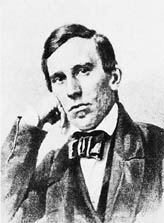
He was the composer of over 200 songs, including such favorites as: "Camptown Races"; "My Old Kentucky Home"; "Jeannie With The Light Brown Hair"; "Oh! Susanna"; and "Old Folks at Home."
Besides these well known songs, Foster also composed some instrumental arrangements of his own songs and popular Italian opera melodies and collected them in The Social Orchestra (published in 1855).
Perhaps the least known of his compositions are his hymns composed in the early 1860s during the Civil War era. Seven of these hymns are included in the CD and Listener's Guide titled,
These Foster hymns are also available on
AMRC 0015: "Glory, Hallelujah" - Songs and Hymns of the Civil War Era
George Gershwin
America 's Musical Crossover Genius
on the 100th anniversary of his birth
Born: Brooklyn, New York, 26 September 1898
Died: Los Angeles, California, 11 July 1937
Gershwin was born in Brooklyn at 242 Snedicker Avenue on in 1898.
One of America's most popular composer, he was able to crossover the bridge the musical theater and the concert hall.
In 1924, he wrote what many believe to be the most appealing concert work by an American composer: Rhapsody in Blue. It's not "a song," as some have called it , but instead is a concert piece, originally performed by Paul Whiteman and His Orchestra at Aeolian Hall in New York.
There are numerous CDs of Gershwin's music. For more information about Gershwin's concert works and songs, order your copy of this guide:
A GUIDE TO GEORGE GERSHWIN (PineTree Press, 2nd edition, 2004)
This handy reference guide is just right for the Gershwin fan. It has lots of useful information, including a detailed chronology of Gershwin's life and music; an essay on Gershwin's genius; a list of Top 40 Gershwin songs; recommended books and recordings of Gershwin's songs and classical works. A CDR with two radio Gershwin birthday tributes are included with this guide.
Can you guess where George Gershwin placed in an Internet poll?
To see the results, go to:Top Ten Favorite American Composers

Charles Edward Ives
Musical Maverickon the 50th anniversary of his death
Born: Danbury, Connecticut, 24 October 1874
Died: New York, New York, 19 May 1954
Considered by many as the greatest American symphonic composer from the early 20th century, he wrote 4 symphonies, numerous orchestral works and chamber music, choral music and over 150 songs.
He is best known today for his symphonies, orchestral works like Three Places in New England, and his many highly original songs.
Recommended Books:
Boatwright, Howard, editor. Essay before a Sonata, The Majority and Other Writings (paperback edition).
Burkholder, J. Peter. Charles Ives and His World (paperback edition).
Kirkpatrick , John . Charles E. Ives: Memos (paperback edition)
Perlis , Vivian . Charles Ives Remembered: An Oral History (paperback edition)
Swafford , Jan . Charles Ives: A Life in Music (paperback edition)
Recommended CDs:
Orchestral -
An American Journey - Thomas Hampson , soloist. San Francisoco Orchestra and Chorus, Michael Tilson Thomas, conductor. RCA # 63703.
Holidays Symphony - First recording of the critical editions. Chicago Symphony Orchestra, Michael Tilson Thomas, conductor. Sony Classical #42381.
Symphony No. 2 and other works - Leonard Bernstein , conductor. Polygram #429220.
Symphony No. 4 and other works - Michael Tilson Thomas and Seiji Ozawa, conductors. Polygram #423243.
Vocal -
Charles Ives: Songs. Jan DeGartani, mezzo-soprano; Gilbert Kalish, piano. 17 songs, superbly performed. Elektra/Nonesuch 9 71325-2.
Rare Choral Music:
There are two early Ives choral works of the 1890s ("Turn Ye" and "Easter Carol") plus choral music by other composers on this special CD:
Can you guess where Charles Ives placed in an Internet poll?
To see the results, go to:Top Ten Favorite American Composers
Edwin Arthur Jones
"A Modest Man of Music"on the 100th anniversary of his death
Born: Stoughton, Massachusetts, 28 June 1853
Died: Stoughton, Massachusetts, 9 January 1911
Read about this New England composer and his music at:Edwin Arthur Jones - Composer and Violinist
Edward MacDowell
Late Romantic Tone Poet
on the 150th anniversary of his birth
Born: New York, New York, 18 December 1860
Died: New York, New York, 23 January 1908
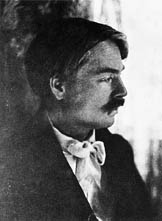
Edward Alexander MacDowell was known especially for his piano works, including his suites:
Woodland Sketches, Sea Pieces, and New England Idyls.His most famous piano piece was "To A Wild Rose" from Woodland Sketches.
He also composed a large number of songs and a small amount of orchestral works, including two concertos (First in 1885/ Second in 1890) and two suites (First completed in 1893/ Second in 1897). His Second Orchestral Suite (subtitled "Indian") was said to be his own personal favorite work and is deservedly in need of more attention.
Read more about Edward MacDowell -- here
Richard Rodgers
Theatrical Tunesmith
on the Centennial anniversary of his birth
Born: Hammels Station, Long Island, New York, 28 June 1902
Died: New York, New York, 30 December 1979
Rodgers worked with two of the great American theater lyricists:
Lorenz Hart (from 1919 to 1943) - Major Shows: Jumbo, 1935; On Your Toes, 1936; Babes in Arms, 1937; The Boys from Syracuse, 1938; Pal Joey, 1940.
Oscar Hammerstein II (from 1943 to 1960) - Major Shows: Oklahoma 1943; Carousel, 1945; South Pacific, 1949; The King and I, 1951; The Sound of Music, 1959.
Rodgers worked with other lyricists after the death of Oscar Hammerstein, including:
Stephen Sondheim (Do I Hear a Waltz?, 1965)
Martin Charnin (Two by Two, 1970; I Remember Mama, 1970)
Rodgers also composed some symphonic scores including these:
"Slaughter on Tenth Avenue" for a ballet sequence choreographed by George Balanchine in On Your Toes
Nursery Ballet - suite by Paul Whiteman and His Orchestra at Cerbegie Hall, New York in 1938.
Ghost Town - American folk ballet produced by the Ballet Russes at the Metopolitan Opera in New York in 1939.
Victory at Sea - orchestrated and conducted by Robert Russell Bennett for the award-winning NBC television series in 1952.
Winston Churchill , the Valiant Hours - music for the television series in 1960.
--Roger Lee Hall, 2010
John Philip Sousa
"The March King"
on the 150th anniversary of his birth
Born: Washington, D.C., 6 November 1854
Died: Reading, Pennsylvania, 6 March 1932
"Composer, bandmaster and writer. He was known as the 'March King' (from a publicist's analogy to Johann Strauss as the 'Waltz King) and was the most important figure in the history of American bands and band music."
--- H. Wiley Hitchcock, The New Grove Dictionary of American Music (Vol. 4, 1986).Of the many recordings of Sousa band marches, here are several recommended CDs:
Fennell Conducts Sousa (Polygram)
Great American Marches (Angel)
Marches and Dances(Arts Music)

George Templeton Strong
American Neo-Romantic
on the 150th anniversary of his birth
Born: New York, New York, 26 May 1856
Died: Geneva, Switzerland, 27 June 1948
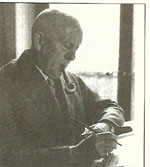
(Photo courtesy of Naxos)
George Templeton Strong was an American Romantic composer whose music was championed by Ansermet, Szigeti, Iturbi, Toscanini, and more recently by Adriano.
While living in Wiesbaden, Germany in the 1880s, he met and became a friend of another important American composer, Edward MacDowell. Strong dedicated his Three Symphonic Idylls for Two Pianos, Op. 29 to MacDowell.
Some of Strong's most accomplished works have been recorded on the Naxos label in the "American Classics" series, performed by the Moscow Symphony Orchestra and conducted by Adriano:
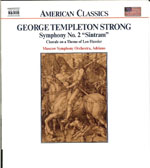
Symphony No. 2 in G minor, Op. 50 ("Sintram")(1887-8 ). This symphony is subtitled: Der Kampf das Menschen gegen die bosen Machte (The Struggle of Mankind Against the Powers of Evil).
It is in four movements:
I. Ziemlisch langsam, Rasch (19:17)
II. Langsam (10:43)
III. Die drei entsetzlichen Gefahrten (The Three Terrible Companions: Death, the Devil and Insanity, 11:12)
IV. Kamp und Sieg (The Victorious Struggle, 18:12).Also on this CD is one of Strong's most profoundly moving works, Chorale on a Theme by Hans Leo Hassler, from 1929 (7:09). This work also was recorded by Howard Hanson with the Eastman Rochester Orchestra. Hanson commented that he found Strong's "flowing counterpoint beautiful." Jose Iturbi conducted it often and said it was a "musical sermon, where the listeners were moved by the composer's utterance." One year it was played on a Boston public radio station on Good Friday and received favorable response from the listeners.
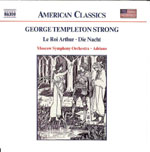
His massive symphonic poem titled, Le Roi Arthur (King Arthur) (1916) (Total time = 40:56) with his homage to Richard Strauss and is three movements: I. Non troppo allegro-Andante-Allegro/ II. Adago-Andante/ III. Allegro-Solennemente e funebre. The other work on this CD is a suite titled: Die Nacht, and subtitled: Four Little Symphonic Poems ( 1913) ( Total time = 26:10).
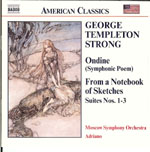
His symphonic poem titled, Ondine (1882-3/revised, 1939)(25:23), and a work titled: From a Notebook of Sketches. This consists of three suites: Suite No. 1 (4 movements, 15:14)/ Suite No. 2 "Athens" (3 movements, 10:49)/ Suite No. 3 (3 movements, 15:56).
Naxos CD 8.559078
--Roger Lee Hall, 2006

Randall Thompson
20th Century Music Craftsmanon the 100th anniversary of his birth
Born: New York, New York, 21 April 1899
Died: Boston, Massachusetts, 9 July 1984
Even though he composed orchestral music, including 3 symphonies; and some chamber and stage music; he is best known for his many outstanding choral works.
Among his best known choral works are: Alleluia (1940), The Testament of Freedom (1943), Frostiania (1959), and A Concord Cantata (1975).
Recommended Books:
Randall Thompson - by Caroline Cepin Benser and David Francis Urrows (hardcover, 1991).
Randall Thompson: A Choral Legacy - by Alfred Mann (paperback,1983).
Recommended CDs:
Orchestral -
Symphonies Nos. 1, 2, and 3. New Zealand Symphony Orchestra, Andrew Schenck. conductor. Koch International Classics CD 3-7413-2, 1997.
Choral -
Testament - American Music for Chorus and Band. Includes Thompson's "The Pasture"; "Stopping by Woods on a Snowy Evening"; "Alleluia"; and "The Testament of Freedom." Also choral works by Ron Nelson, Howard Hanson, Aaron Copland, and Leonard Bernstein. Turtle Creek Chorale, Dr. Timothy Seelig, artistic director. Reference Recordings CD RR-49, 1992.
The Testament of Freedom. Also includes: Frostiana. New York Choral Society, Manhattan Chamber Orchestra, Richard Auldon Clark, conductor. Koch International Classics CD 3-7283-2, 1995.
Hear several choral works by Randall Thompson on the CD:
AMRC No. 0004: Memorial Tribute for Three American Composers
Meredith Willson
America's "Music Man"
on the 100th anniversary of his birth
Born: Mason City, Iowa, May 18, 1902
Died: Santa Monica, California, June 15, 1984
Meredith Willson was a composer, lyricist, conductor, and flutist. He played in John Philip Sousa's famous band while still a student at the Julliard School in New York. He also played flute in the New York Philharmonic between 1924 and 1929. Willson later worked on both radio and television as a composer and conductor for ABC and NBC.
Even though he composer some classical music (including two symphonies), Meredith Willson is known for his three major theater musicals which he wrote both the words and music;
The Music Man, 1957 ("Seventy-six Trombones"; "Till There Was You")
The Unsinkable Molly Brown, 1960 ("I Ain't Down Yet"; "Belly Up to the Bar, Boys")
Here's Love, 1963 ("Arm in Arm"; "You Don't Know")
He also wrote a novel and three books of memoirs, between 1948 and 1959.
The Meredith Willson Library of Popular American Sheet Music is located at the University of California in Los Angeles.
[above information compiled from the entry by Larry Stempel in The New Grove Dictionary of American Music, Volume 4, 1986]
His two symphonies, recorded by the Moscow Symphony Orchestra, conducted by William T. Stromberg are available here:
Symphony No. 1 in F minor ("A Symphony of San Francisco")(1936)
Symphony No. 2 in E minor ("The Missions of California")(1940)
American Composers on CD
For over 50 CDs with music by American composers, go to:
American Music Recordings Collection [AMRC]
American Music Resources
Are you looking for American music for research or teaching?
Look in the CAMP Store
In search of a music lecture or a workshop on American music?
Go to --Lectures and Workshops
Name Your Favorite Tunes
An annual event is held each October,
sponsored by The Tune Lovers Society.Anyone can participate as long as the tunes are
by American composers or songwriters from the past.For more details, go to:
Tunemaker Hall of Fame
This annual event was sponsored by The Tune Lovers Society.
Each year there were ten American composers and songwriters added to a Hall of Fame.
To read the names listed for each year, click on this link:
Send any questions or comments to:
American Classical Composers:
From Colonial Era to Our Time
Please help support the mission of the
Center for American Music Preservation
Order your music titles from the
© 2006-2024 PineTree Productions. All Rights Reserved for original material on this website. Contact: pinetreepro@aol.com





